 |
|||||||||




 |
|||||||||




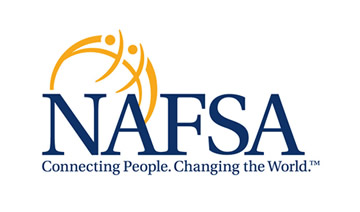
WASHINGTON, May 21, 2020 — The Association of International Educators NAFSA says it surveyed senior leadership at U.S.-based higher education institutions and international education organizations to gauge the financial impact of COVID-19 on the field of international education.
According to NAFSA, survey results indicate that, overall, U.S. higher education had potentially lost nearly $1 billion due to shortened or canceled study abroad programs. Further, it spent approximately $638 million in financial support for international students, scholars, faculty, and staff who remained on campus when courses moved online.
Responses estimate that U.S. higher education will lose at least $3 billion due to anticipated international student enrollment declines for fall 2020. NAFSA survey has concluded that without congressional action and financial relief to support global culture, there would be a loss of more than $4.5 billion to U.S. higher education and tens of thousands of American jobs.
“With travel restrictions, visa delays, and economic instability worldwide, COVID-19 has been incredibly harmful to the field of international education,” said Esther D. Brimmer, Executive Director and CEO of the Association of International Educators NAFSA. “We need Congress to support legislation protecting international education to save American jobs and ensure U.S. students remain globally competitive at a time where we cannot afford to lose our competitive edge.”
Detailed Survey Results:
• Study Abroad
94% of institutions with study abroad programs reported shortened or canceled spring and summer programs, resulting in losses of $115 million; when estimated across all of U.S. higher education, potential losses total nearly $1 billion.
65% responded that the cancellation of study abroad programs had impacted staff positions in education abroad offices. Impacts include reduced hours, furloughs, eliminated jobs, hiring freezes, and salary reductions.
61% expressed uncertainty if study abroad programs will be offered for fall 2020, while 15% anticipated cancelations.
• International Students
38% indicated ongoing support for international students who remained on campus, spending nearly $42 million; when extrapolated across all of U.S. higher education, potential spending totals $418.5 million. Types of support include housing, scholarships, food, rent, airfare, and tuition refunds.
60% reported up to 5 staff positions funded by international student fees.
78% anticipate enrollment declines for fall 2020, with a loss of $192 million in revenue; estimated across all of U.S. higher education, potential revenue losses total at least $3 billion.
• International Scholars, Faculty, Staff
55% host or employ international scholars, faculty, and staff, with 77% indicating ongoing support/employment during the crisis.
36% reported providing additional financial support totaling nearly $6 million; estimated across all of U.S. higher education, expenditures approximate $219 million.
51% responded that staff positions in international student/scholar offices would not be impacted by COVID-19, while 24% indicated it was too soon to know, and 21% said it would affect jobs.
Impacts include reduced hours, furloughs, eliminated positions, hiring freezes, and salary reductions.
• Other Negative Financial Impacts
NAFSA said it had prepared several requests to the Congress to mitigate the pandemic’s damage on the international education field and to position its recovery when it is safe for American students to study abroad and for international students and scholars to return to the U.S. These requests include petitions for policy changes, such as waiving the in-person interview requirement for visas, and direct financial assistance totaling $46.6 billion.
The Association of International Educators NAFSA is the world’s largest nonprofit association dedicated to international education.
Source: NAFSA
|GlobalGiants.Com|
Edited & Posted by the Editor | 7:26 AM | View the original post
The Best US Universities for Excellence, Equity, and Employability.
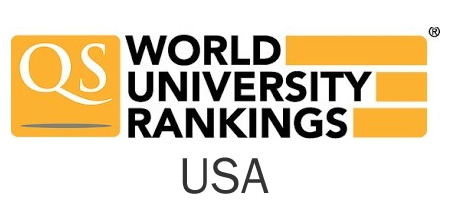
LONDON, May 20, 2020 — QS Quacquarelli Symonds, the publishers of the QS World University Rankings, today released their inaugural ranking of America’s top universities.
The QS World University Rankings USA assesses how well universities are responding to the social, intellectual, and economic challenges. QS said it had ranked the Universities according to their research performance and career outcomes as well as a range of indicators evaluating each institution’s social impact and attempts to foster equitability.
The methodology also evaluates universities based on the efforts they are making to support the 17 UN Sustainable Development goals.
QS CEO Nunzio Quacquarelli said, “QS surveyed 33,000+ prospective university students since the start of the pandemic. Though COVID-19’s effects on higher education will resonate for years to come, our research reveals that it does not deter students from pursuing their education goals. We hope that this ranking will provide students with an insightful comparative tool, as they prepare for the next steps in their educational journey.”
The QS World University Rankings USA see Harvard University named America’s top university, placed ahead of Stanford University (2nd) and Massachusetts Institute of Technology (3rd).
Harvard’s leadership got perfect scores for QS’s Research and Employability indicators, which suggests that, on average, Harvard produces America’s most impactful research and most employable graduates, QS said.
Five American colleges achieve perfect scores for QS’s Learning Experience indicator: Yale University, Duke University, Johns Hopkins University, Northwestern University, and Brown University.
QS Research Director Ben Sowter said, “For thirty years, QS has served the global student community with the independent insights they need to make informed decisions. Our Employer Reputation indicator, a dataset based on the sentiments of over 44,000 hiring managers worldwide, allows potential applicants to assess US universities based on their ability to enhance their future careers.”
Sowter continued, “As the global graduate jobs market becomes even more competitive, our research suggests that students are placing a greater emphasis on this information. With the pandemic further disrupting the graduate employment market, we predict that concern about education and employability will intensify.”
QS has named 300 institutions as the best four-year universities in the United States.
• QS World University Rankings USA
• 101-110
• 111-120
• 121-130
• 131-140
• 141-150
• 151-160
• 161-170
• 171-180
• 181-190
• 191-200
• 201-250
• 251-300
Source: QS Quacquarelli Symonds
|GlobalGiants.Com|
Edited & Posted by the Editor | 3:39 PM | View the original post
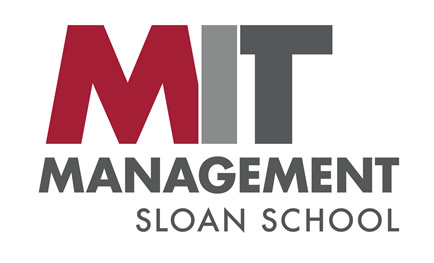
CAMBRIDGE, Mass., May 18, 2020 — In response to the COVID-19 pandemic, researchers from the Massachusetts Institute of Technology have published their studies in a COVID-19 special issue of the Harvard Data Science Review. The studies describe new methods for accelerating drug approvals during pandemics and for providing more accurate measures of the probabilities of success for clinical trials of vaccines and other anti-infective therapies.
“Randomized clinical trials are the gold standard for determining the safety and effectiveness of a treatment,” said Andrew Lo, Ph.D., the study’s senior author, and the Charles E. and Susan T. Harris Professor at the MIT Sloan School of Management. In randomized clinical trials, patients are assigned randomly to two groups, one receiving a new treatment and the other receiving a placebo or reference treatment.
“Only when the treatment group shows significant improvement over the control group, will regulators approve the therapy,” explained Lo. “The current process protects the public by minimizing the chances of ‘false positives’ (approving ineffective and unsafe therapies), and by and large, it’s been very successful,” he added.
But there is a trade-off between false positives and false negatives (not approving a safe and effective therapy). So Lo and his collaborators have developed a framework that uses an epidemiological model of COVID-19 to calculate the optimal statistical threshold for approving a drug during a pandemic. “During an outbreak, many lives are at stake, so we need to be less concerned about false positives and more concerned about false negatives than during normal times,” said Lo. “In response, we’ve developed an analytic framework that allows regulators to make this trade-off systematically, transparently, and rationally,” he elaborated.
At the core of this new framework (jointly developed in collaboration with MIT students Qingyang Xu and Danying Xiao, and former MIT student Shomesh Chaudhuri, Ph.D.) is an explicit optimization algorithm. It minimizes the expected loss of life across various scenarios generated by a statistical model of an infectious disease. This algorithm, said Xu, will lead to more drug approvals during outbreaks, unlike the U.S. Food and Drug Administration’s Emergency Use Authorizations (EUA) program. “Our framework complements the EUA, allowing regulators to incorporate loss-of-life considerations quantitatively during periods of extraordinary stress,” explained Xu, the lead investigator of the study.
“The probabilities of success (PoS) is a key input into each major decision of every biopharma company,” observed Lo. PoS helps a biopharma company decide which disease to tackle and how much resources to devote to it, he added.
Because a successful clinical trial can mean billions of dollars in revenues, small changes in PoS can lead to very different business decisions. Therefore, having timely and accurate measures of PoS is critical — and often, these better measures of risk and reward allow investors to put more capital to work.
Governments around the world would soon begin to formulate a more systematic strategy for dealing with pandemics beyond COVID-19, said Wong, the study’s lead author. “The PoS estimates can be used by policymakers to identify areas most likely to be underserved by private sector engagement and in need of public sector support,” he added.
These results are part of Project ALPHA (Analytics for Life-sciences Professionals and Healthcare Advocates), an ongoing initiative at the MIT Laboratory for Financial Engineering (LFE), where Lo is the Director. The results would help make the biomedical funding ecosystem more efficient. “We now provide this information regularly, it’s not just a one-shot deal,” Lo said. Users can now obtain the most current PoS estimates.
The Harvard Data Science Review (HDSR), where this study appears, is published by the MIT Press. Established in 1962, the MIT Press is one of the largest and most distinguished university presses in the world.
Source: MIT Sloan School of Management
|GlobalGiants.Com|
Edited & Posted by the Editor | 10:28 AM | View the original post
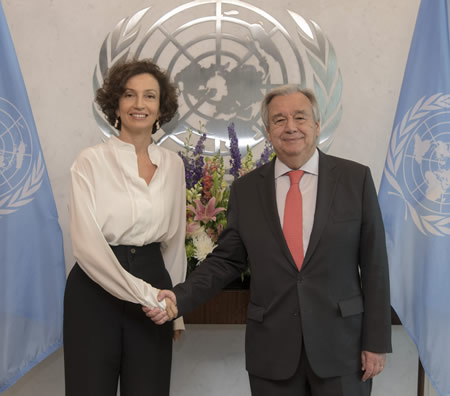
Photo: UN Secretary-General António Guterres (right) meets with Audrey Azoulay, Director-General of the United Nations Educational, Scientific, and Cultural Organization (UNESCO). July 16, 2019. United Nations, New York. UN Photo/Mark Garten. [File Photo]
Paris, France, May 18, 2020 — UNESCO has now opened its call for applications and nominations for the 2020 UNESCO International Literacy Prizes. This year UNESCO will reward five individuals or organizations around the world for their outstanding projects that promote literacy within the theme’ Teaching and learning literacy: the role of educators and changing pedagogies’.
This year’s thematic focus is highlighting teachers who are at the frontline of delivering literacy learning, and their contribution to promoting youth and adult literacy, linked to the Target 4.6 of the Sustainable Development Goal on Education (SDG4).
Since 1967, the UNESCO International Literacy Prizes have rewarded excellence and innovation in the field of literacy. Over 495 projects and programs around the world have already received recognition and support for their excellent work.
• Who can Apply and Who can Nominate?
Governments, non-governmental organizations, and individuals who promote literacy through projects and programs are welcome to apply.
Candidates should submit their Applications to Nominating Entities, such as the National Commission for UNESCO, in the program’s country.
Candidates can also submit their applications through the online platform. Details about the application and nomination process are on the UNESCO International Literacy Prizes’ website.
National Commissions and non-governmental organizations (NGOs) in official partnership with UNESCO are encouraged to nominate individuals, institutions, and organizations who are making outstanding contributions to promoting literacy and who request a nomination.
- Deadline for candidates to submit to nominating entities: June 28, 2020; midnight, Paris time.
- Deadline for nominating bodies to submit their nominations to UNESCO: July 12, 2020; midnight, Paris time.
An independent International Jury would asses the nominations. The Jury would be composed of five experts based on the selection criteria. The Director-General of UNESCO would select the award winners on the recommendations of the International Jury. UNESCO would present the prizes on the occasion of International Literacy Day.
• About the Prizes
Through two prestigious literacy Prizes, UNESCO supports effective literacy practices and encourages the promotion of dynamic literate societies to close the literacy gap of approximately 750 million people.
UNESCO distinguishes between two Literacy Prizes received by five laureates in total:
- The UNESCO King Sejong Literacy Prize (2 awards), was established in 1989. The Government of the Republic of Korea supports it. This Prize gives special consideration to programs that focus on the development and use of mother-tongue literacy education and training.
- The UNESCO Confucius Prize for Literacy (3 awards), was established in 2005. The Government of the People’s Republic of China supports it. This Prize recognizes programs that promote literacy amongst adults in rural areas and out-of-school youth, particularly girls and women.
Each Prizewinner receives a Medal, a Diploma, and US$ 20,000.
Source: UNESCO
|GlobalGiants.Com|
Edited & Posted by the Editor | 11:19 AM | View the original post
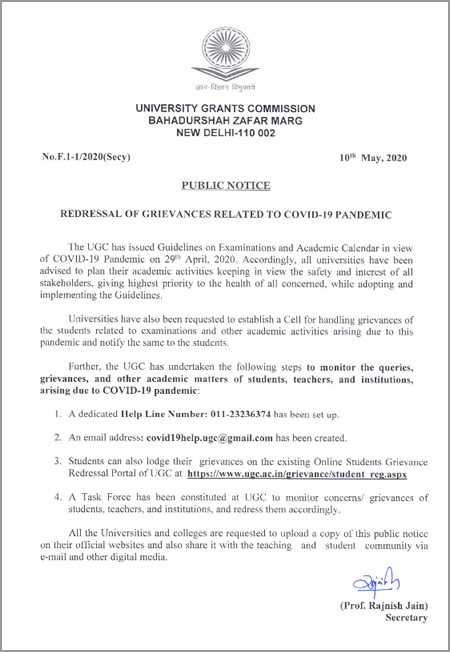
Photo: University Grants Commission (India) — Public Notice.
Source: University Grants Commission, New Delhi.
|GlobalGiants.Com|
Edited & Posted by the Editor | 4:15 AM | View the original post
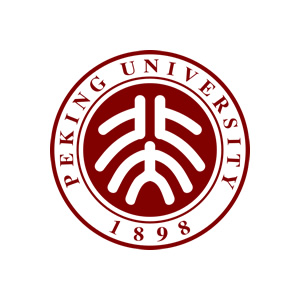
BEIJING, May 9, 2020 — Since the COVID-19 outbreak, Peking University has been at the forefront of the battle against the novel coronavirus.
While China has gradually brought it under control, countries across the world are still struggling to contain it. In light of this, the School of Foreign Languages (SFL) at Peking University translated China’s official documents on the prevention and control of COVID-19 into Arabic. It released Counter COVID-19 Documents (Arabic Version) on May 6 during a video conference with 11 Arab ambassadors to China, director of the Representative Office of the League of Arab States to China, and 8 Arab envoys to China.
Since March, in the hope of sharing China’s anti-pandemic experience with the Arab world, faculty and students from the Department of Arabic Language have dedicated themselves to the translation of guidelines formulated by China’s National Health Commission. These valuable resources would be accessible to the broader Arab community. It would help 400 million people living in 22 Arab countries and regions learn more about the coronavirus and eventually conquer it.
The Arabic compilation includes the “Protocol on Prevention and Control of COVID-19 (Editions 1-6)”. The university invited foreign experts to check the translations and ensure their accuracy.
Besides, experts at Peking University Health Science Center have done proofreading for several vital guidance documents produced in English.
Furthermore, as part of the efforts to help foreigners better understand medical terms that they might come across in notices and news written in Chinese, the faculty, and students from the School of Foreign Languages (SFL) have put together a multilingual COVID-19 terminology handbook in 21 different languages.
Ph.D. candidate Chen Binbin from the Department of Chinese at Peking University went to great lengths to set up a translation group, known as the China-Iran Epidemic Prevention Mutual Assistance Team. He brought together over 200 volunteers from China, Iran, and Afghanistan to translate China’s anti-pandemic knowledge and experience into Persian and sharing them with Iranians via social media platforms.
Following the COVID-19 outbreak, Peking University adopted various measures in its response. It dispatched Medical teams of 454 healthcare professionals from its affiliated hospitals to Wuhan, China’s worst-hit city. This semester, over 2,800 teachers taught 4,437 online courses to more than 40,000 students on a variety of online platforms. Sixty of Peking University’s international teachers coming from 31 different countries and regions across five continents overcame the challenges posed by being in different time zones and continued to teach their classes.
According to Peking University, it has been proactive in sharing its anti-pandemic experience with universities around the world over the past few months. It participated in the university-wide dialogues of the World Economic Forum’s Global University Leaders Forum. Further, Peking University convened video conferences with partner universities, including the University of Tokyo, University College London, Cairo University, University of Michigan, and Qatar University.
International cooperation is playing a crucial role in the fight against the pandemic as the COVID-19 outbreak remains rampant in many parts of the world. Peking University said it would continue to maintain online communication with higher education institutions across the globe, and all members of the Peking University community will spare no effort to support the global fight.
Source: Peking University.
|GlobalGiants.Com|
Edited & Posted by the Editor | 9:22 AM | View the original post
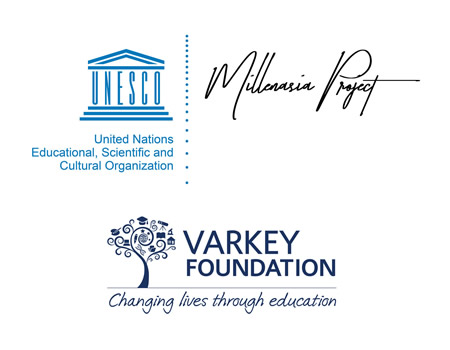
SEOUL, South Korea, May 6, 2020 — Millenasia, a millennial brand for quality Asian content, today released “Be The Future,” a K-Pop music video encouraging young people to take measures to prevent the transmission of COVID-19. In releasing the video, the Millenasia Project band urged the world to unite in support of the 1.5 billion learners who have been affected by school and university closures as a result of COVID-19.
Millenasia is a next-generation media company focused on targeting Asian millennials.
The music video — starring Millenasia Project, a project band composed of K-Pop artists AleXa, Dreamcatcher and IN2IT — was conceived by Millenasia and created in partnership with the Varkey Foundation, a member of UNESCO’s Global Education Coalition.
According to UNESCO, 1.5 billion students have been affected by school and university closures due to the COVID-19 outbreak. In direct response, UNESCO launched the Global Education Coalition to facilitate inclusive learning opportunities for children and youth during this period of sudden and unprecedented educational disruption.
Stefania Giannini, Assistant Director-General for Education at UNESCO, said, “I am delighted that these K-pop artists have united in sending an important message about staying safe during this global pandemic. Our Global Education Coalition is determined to do all it can to facilitate inclusive learning opportunities for the 1.5 billion students and youth across the planet that have been affected by school and university closures due to the COVID-19 outbreak. Crucially, we’re determined to put the teacher voice at the heart of our mission to give every child their birthright, a good education.”
The Varkey Foundation, which established the annual US $1 million Global Teacher Prize to shine a light on the global teaching profession, was also excited to partner on the new music video.
Sunny Varkey, Founder of the Varkey Foundation and Global Teacher Prize, said: “This music video is a fantastic way to ensure important messages about COVID-19 reach young people throughout the world. I am delighted that this video features 2020 Global Teacher Prize finalist, Yun Jeong Hyun, highlighting how teachers across the world continue to inspire, even as the world shifts under their feet. Now, more than ever, we must shine a light on the world’s teachers.”
“With hundreds of million fans around the world, K-Pop has proven to be a global sound for music,” Keiko Bang, CEO of Millenasia, said. “We wanted to make sure we were able to use a medium that would be family-friendly, but more importantly, resonated with the youth.”
AleXa said, “I strongly hope that this song and its message of health catches young people’s attention. Don’t let the seclusion get you down. It’s important to stay connected to school, teachers, and friends.”
It is for the first time K-Pop has been used as part of a UNESCO initiative and is a tribute to the medium, which has accumulated more than an estimated 400 million fans in over 230 countries and regions worldwide. “Be The Future” delivers a universal and profoundly important message that will resonate with people from all walks of life, media company Millenasia said.
The Millenasia Project band was filmed and recorded just outside of Seoul, South Korea, in late April with the production exercising best practices for social distancing at work. The music video collaboration was conceived, produced, and released by Millenasia in just four weeks with composition, lyrics, and choreography turned around in only two weeks.
• Watch the Official Music Video on YouTube here…
https://www.youtube.com/watch?v=P-kVolThSaE
The artists, IN2IT, Dreamcatcher, and Alexa in a joint statement, said:
“We urge the world to unite to support the 1.5 billion learners who have been affected by school and university closures as a result of COVID-19. Amidst this crisis, the world has discovered new reserves of creativity, compassion, and resolve. We must ensure that the impact of the coronavirus pandemic on education strengthens, rather than weakens, our resolve to fulfill every child’s right to good education”.
“Be The Future” is available now through Millenasia’s YouTube channel, and on Apple Music, Spotify, Melon, Anghami, Boomplay, and 25 other music platforms around the world.
|GlobalGiants.Com|
Edited & Posted by the Editor | 11:51 AM | View the original post
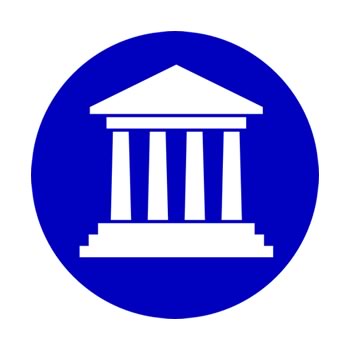
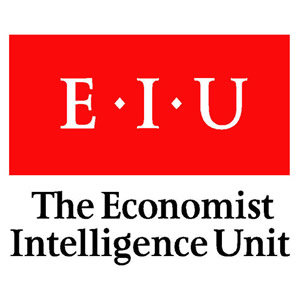
DOHA (QATAR), WASHINGTON, ATLANTA, and LONDON, May 4, 2020 — Students will have the power to bankrupt universities that do not meet their expectations in a post-COVID-19 world, a US educator has warned. He was speaking at the launch of a major new research report into the future of higher education, commissioned by the Qatar Foundation (QF).
The Economist Intelligence Unit (EIU) has produced that report. It is entitled “New schools of thought: Innovative models for delivering higher education.” The report outlines how higher education institutions must adapt to survive as they face dwindling public funding, questions over their value, and the challenges that technology and automation pose.
At the launch of the report today, an EIU panel discussion sponsored by QF saw education experts from three continents explore its findings and share their views on the future of higher education.
Ben Nelson, Founder, Chairman, and CEO of Minerva Schools at Keck Graduate Institute, said: “Students have an extraordinary responsibility this year because, for the first time in living memory, they can bring institutions down to bankruptcy.
“They can vote with their feet in a way they have never been able to do before — opting to slip out of college for a year can shut down an institution. For the first time, the student’s role is that of the determinant partner — determining what universities should be doing and which ones should have the right to serve them going forward.”
“When societies and students interact with institutions and not get what they are paying for, there is going to be a reckoning.”
Dr. Mary Schmidt Campbell, President of Spelman College, told the discussion that academic partnerships are “critical in days like this,” adding, “Institutions have to stop being so precious and siloed and sequestered.”
“Everyone benefits from collaboration, but it takes a very different mindset to what we have now. If we fall back into marketing and competition mode, we are not going to get anywhere.”
Francisco Marmolejo, QF’s Education Advisor, said higher education institutions must “challenge their assumptions” that as soon as conditions return to normal, we may try to become the same as we were before. “This crisis is telling us we no longer have the luxury of assuming things will be as they used to be.”
Qatar Foundation for Education, Science, and Community Development (QF) is a non-profit organization. While the Economist Intelligence Unit (EIU) is the research and analysis division of the Economist Group. It provides forecasting and advisory services.
|GlobalGiants.Com|
Edited & Posted by the Editor | 9:38 AM | View the original post
Chandigarh University becomes the first University in India to announce a special scholarship for the children of doctors, para-medical staff, sanitation workers, media persons, and police personnel.
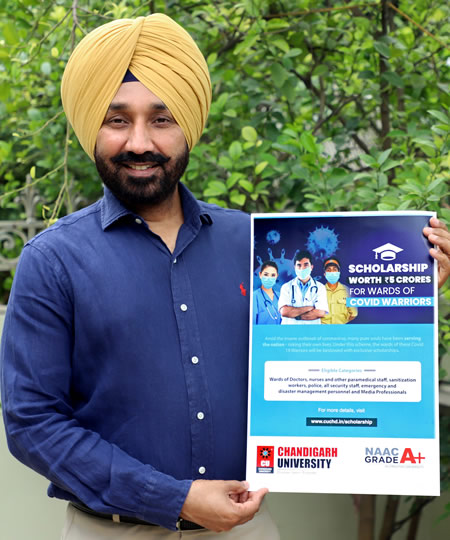
Photo: Satnam Singh Sandhu, Chancellor of Chandigarh University, launching the Special Scholarship Scheme for the wards of COVID-19 Warriors.
CHANDIGARH, India, April 21, 2020 — While the war against coronavirus is continuing, Chandigarh University has paid tribute to the real warriors battling at the frontline against the pandemic in India by announcing COVID-19 Warriors Scholarship. While announcing the scholarship scheme, Satnam Singh Sandhu, Chancellor, Chandigarh University, said, “The institution would provide scholarships worth Rs. Five crores to the wards of COVID-19 warriors, which include doctors, nurses, para-medical staff, housekeeping staff of hospitals, police personnel of all Indian states, paramilitary forces, media persons, and sanitation workers. We are honoring those who are stepping out of their homes and working tirelessly amid this pandemic crisis. They are risking their lives to ensure that every one of us remains safe.”
CU said that it is the first University in India to announce financial assistance for COVID-19 warriors.
Under the COVID-19 Warriors Scholarship Scheme, Chandigarh University would reserve 10% seats in all the under-graduate and post-graduate programs for the wards of COVID-19 Warriors and the students admitted under this category would be eligible for 10% fee rebate throughout the entire duration of the program.
“COVID-19 warriors are everyday superheroes. The entire nation owes them a tremendous debt of gratitude,” Satnam Sandhu said. “Taking care of the future of their children through the COVID-19 Warrior Scholarship is just a small attempt to recognize and express our gratefulness towards them. They are serving others without caring about themselves, since, for them, call of duty is paramount,” he added.
Ever since the lockdown, Chandigarh University has kicked off CU-AID Campaign, under which cooked meals are being distributed twice a day to 2000 poor and needy in Chandigarh and Mohali. The University team is also carrying out distribution drives of hand sanitizer and to date have distributed 3500 liters of sanitizers to different organizations, which include AIIMS New Delhi, Punjab Police, orphanages, and villages of Chandigarh and Mohali. In support of District Administration Mohali, Chandigarh University has also set-up Punjab’s largest Isolation Facility at Gharuan, which has a capacity of 1000 beds. University volunteers have also reached out to feed stray animals who have been under distress due to the lack of availability of food during the lockdown.
Chandigarh University is the youngest University in India and the only private University in Punjab to be honored with A+ Grade by NAAC (National Assessment and Accreditation Council).
|GlobalGiants.Com|
Edited & Posted by the Editor | 11:54 AM | View the original post
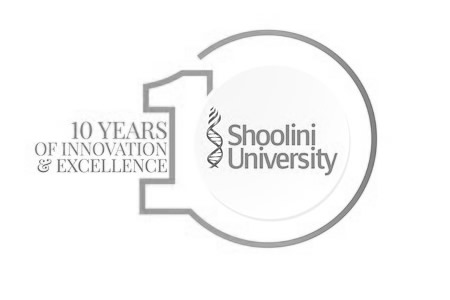
SOLAN, India, April 14, 2020 — Ten-year-old Shoolini University celebrated its 16th Foundation Day on April 13, 2020. It was on this day in 2007 that the foundation stone of its first building was laid on the campus at Bajhol, Himachal Pradesh.
Because of the closure of the campus due to the coronavirus outbreak, the University could not organize any festivities. Still, Vice-Chancellor Prof. P. K. Khosla greeted the students, faculty, and the staff through a video call to mark the memorable occasion.
Greeting them on Baisakhi and the 16th Foundation Day, Prof Khosla said he was happy to share that the University had taken the lead over most other institutions in the country by quickly adopting e-learning through virtual classrooms. “We could do as our IT team has been working on this model for quite some time. It was several years ago that we embraced e-Univ technology,” he said, adding that the University was able to start online classes within three days of the lockdown.
Prof. Khosla said that with little likelihood of a return to normalcy in the next couple of months, the University was working on taking end-term online examinations to save the Semester for its diligent students. While tests for the theory portion of various subjects would take place online, practical exams would take place after special practical classes on weekends or during extended University timings, once the campus re-opened, he stated.
To enhance the learning experience of students, the University has also introduced daily Yogananda Webinars for students and faculty. Eminent persons from various fields throw light on subjects of their expertise through interactive media tools. Among those who have participated in webinars so far is the former Delhi University Vice-Chancellor, Dr. Dinesh Singh.
Thanking the students and their parents, as well as the faculty for cooperating during these difficult times, the Vice-Chancellor said the institution is taking measures to ensure that other significant activities of the University, such as placements and admissions, continued smoothly. “Our Placement team has been active since October last year - much before the outbreak of Coronavirus - and has finalized over 200 campus placements. It is now continuing the effort through organizing online interviews,” he added.
|GlobalGiants.Com|
Edited & Posted by the Editor | 8:03 AM | View the original post

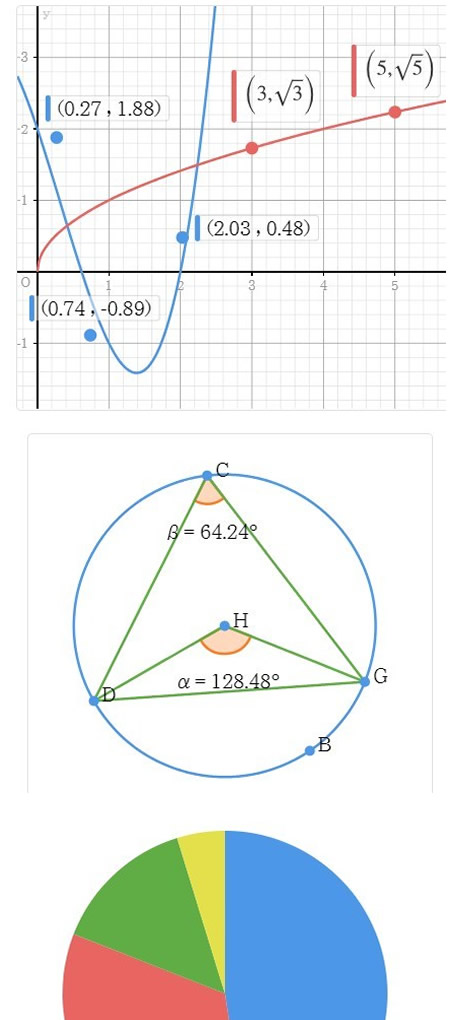
Photo: CASIO ClassPad Example.
TOKYO, April 15, 2020 — Casio Computer Co., Ltd., announced today that it has now made the full PLUS suite of its ClassPad Web service for mathematical calculations free of charge worldwide. It would support students and teachers dealing with school closures due to the novel coronavirus pandemic. Usually available as a paid subscription, the PLUS suite gives users access to all of ClassPad’s most advanced function calculation and graphing features. Casio has also made its Manager and Emulator software applications free of charge for teachers conducting online classes. Both will be free until August 31, 2020.
ClassPad is a Web service that allows users to calculate functions, make graphs, and perform both statistical and geometric calculations. Users can freely arrange their numerical formulas, geometric figures, and charts in the browser window. Casio is now providing the highest-grade PLUS suite free of charge — giving all users access to a computer algebra system (CAS). CAS can perform a wide variety of calculations based on expressions as well as other advanced features, such as the ability to handwrite math input. Graphs and other data created on ClasPad can be saved and shared for individual learning at home and online classes.
The other offering now made free is the Casio Manager and Emulator for teachers. It reproduces the operations of scientific calculators on PCs. These apps work with video conferencing tools to make it easy for students to see graphs and formulas the instructor writes on his or her screen during an online class. Even when students cannot meet in person for tuition due to school closures or stay-at-home orders, teachers can use these tools to teach calculation methods easily via the Web.
According to Casio, one has to download and install the software applications from the following education website to avail of the offer, free until August 31, 2020.
Casio’s Education Website:
https://edu.casio.com/softwarelicense/aid/
|GlobalGiants.Com|
Edited & Posted by the Editor | 8:03 AM | View the original post
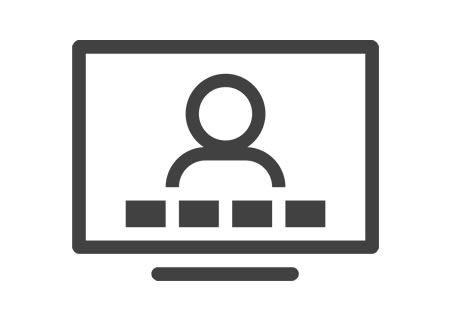
New Delhi, April 13, 2020 — The Vice President of India, M Venkaiah Naidu, today asked Universities and other educational institutions to harness the power of technology fully to ensure continuity of academic calendar during the lockdown period.
The Vice President, who is the President of the Indian Institute of Public Administration (IIPA) and also Chancellor of some Universities, addressed the Director of IIPA and the Vice-Chancellors of Universities through a video conference. The Vice-Chancellors he spoke to included those of Delhi, Puducherry, Panjab, and Makhanlal Chaturvedi Universities. He inquired about their plans to cope with the disruption caused by the COVID-19 pandemic.
The Vice President urged the institutions to reach out to students, promote collaborative learning and self-learning. He wanted them to optimally utilize technological tools for ensuring interactive education for all students and ensure continuity of the teaching and learning process during the lockdown.
Observing that the adversity caused by the Coronavirus was forcing people to search for creative solutions, Mr. Naidu appreciated the universities for taking adequate steps to ensure that the teaching-learning process continues unhindered. Noting that online courses would supplement face-to-face learning, he said: “this might become the new normal after we tide over the current crisis.”
The Vice President also emphasized the need for universities and educational institutions to take measures to safeguard the health of students residing in hostels. He urged them to ensure strict adherence to social distancing and isolation instructions given by the Government and health experts.
Advising the students to follow healthy dietary habits, undertake regular physical exercise, and avoid a sedentary lifestyle, Mr. Naidu emphasized the importance of living with nature.
Mr. Naidu urged the universities to guide the students to utilize the time meaningfully and take advantage of the e-learning materials offered by them. He also wanted the students to spend less time on mobile phones and learn new languages during the lockdown period. Besides, they should also spend adequate time with family members, he advised.
The Vice President suggested to the students to join in social service activities taken up by NGOs in their respective areas. He stressed the need for all citizens to follow the guidelines issued by the government from time-to-time strictly.
|GlobalGiants.Com|
Edited & Posted by the Editor | 9:30 AM | View the original post
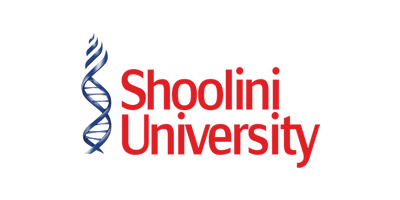
SOLAN, India, April 9, 2020 — Shoolini University, located in Himachal Pradesh, India, is among the first to introduce virtual classrooms in the wake of the coronavirus outbreak. Shoolini has now offered to share its expertise with other institutions in India keen to teach students online.
In line with the top global universities like Oxford and Harvard, Shoolini University, which is run by a trust, has evolved a system through which professors would deliver lectures through a unique online platform.
Aaddoo, a technology company, has developed the system. Aaddoo has been working with Shoolini University for the last six months. Through the system, the students can attend the delivery of live lectures through virtual classrooms. They can ask questions and get answers in real-time by using personal computers, laptops, or smartphones. They can participate in real-time quizzes and polls. Further, based on artificial intelligence, insights on individual students are available.
Vice-Chancellor Prof. P. K. Khosla said, “Aaddoo was already in the process of developing the system for the last six months. We speeded up the efforts because of the coronavirus outbreak and the necessity of shutting down educational institutions and other places that witness large gatherings.”
“The idea behind the introduction of virtual classrooms was to save the academic semester of the students whom we have asked to leave for their respective homes,” Prof Khosla added. The Vice-Chancellor said the University would be happy to freely share the expertise with all institutions, including government schools and colleges so that students of such institutions do not suffer due to a possible prolonged lockdown.
Set up in 2009, Shoolini University of Biotechnology and Management Sciences is a research-driven private university with full-recognition from the University Grants Commission. A leading university in India, it is recognized for its focus on innovation, quality placements, and world-class faculty. Nestled in the lower Himalayas, the University has received accreditation from NAAC (National Assessment and Accreditation Council), while NIRF (National Institutional Ranking Framework) has ranked it.
|GlobalGiants.Com|
Edited & Posted by the Editor | 10:38 AM | View the original post
Chandigarh University prepares two quarantine facilities with 1000 beds each and a Separate Isolation Facility for Doctors and Para-Medical Staff.
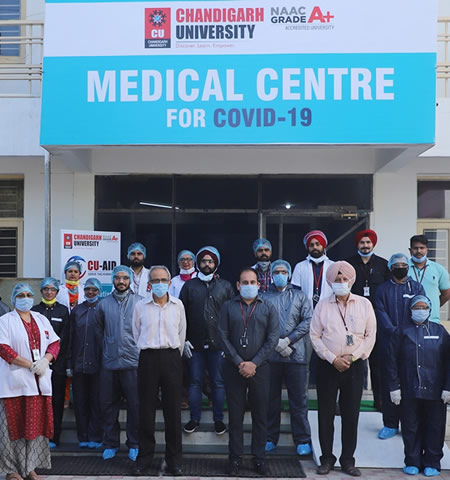
Photo: Medical Team of Chandigarh University at the CU-Isolation Facility at Gharuan established by CU and District Administration Mohali.
Chandigarh, India, April 9, 2020, — Continuing to extend a helping hand in the time of crisis, Chandigarh University, in association with District Administration, Mohali, has established Punjab’s largest COVID-19 isolation facility under its CU-AID initiative near its campus.
“We have prepared two CU-Isolation Complexes under the guidance of the Punjab Government. Each complex comprises 1000 bed quarantine facility, 200-bed medical center, OPD for patients, and protection kits, including face masks for patients,” University Chancellor, Satnam Singh Sandhu said. “COVID-19 dedicated facility has round the clock medical team comprising Doctors and 50 Para-Medical staff who will be looking after the patients. There is a 24x7 ambulance facility to shift the patients.”
Satnam Sandhu explained, “CU-Isolation facility has all the basic medical facilities, oxygen cylinders, and other biomedical equipment. The quarantine facility can be further scaled up for 5000 patients within a few days in case of emergency and if the requirement of the administration increases.”
Deputy Commissioner Mohali, Girish Dayalan (IAS), said, “Punjab Government is taking all precautions, and the District Administration Mohali is gearing itself to meet any emergency in future.” “CU-Isolation facility is part of the State Government’s contingency plan to prepare isolation facilities well in advance. In case the number of infected cases rises, the administration can take care to isolate them with the quickest response time,” he added.
“We are thankful to the management and the staff of Chandigarh University for creating the facility in a short time,” Mr. Dayalan added. “The District Administration Mohali is running the CU-AID campaign along with Chandigarh University in Kharar and nearby villages. The University Team is distributing cooked meals twice a day to more than 2000 persons. The medical team of the University is distributing free hand sanitizers and face masks to the poor and needy. We request other educational institutions and organizations like CU to come forward and extend their help to the Administration and the Government in this time of crisis.”
“We have inspected the CU-Isolation Facility at Gharuan and found that every emergency facility required for the COVID-19 patients is in place. It includes ICU Units, Medicines, PPE Kits for the Medical Team, and Ambulance facility to shift the patients,” said Himanshu Jain (IAS), SDM Kharar. The CU-Isolation facility will be beneficial for the administration, in case there is a spike in infection cases in the nearby villages or Kharar.
• Chandigarh University (CU) is the youngest University in India to be accredited with A+ Grade by NAAC (National Assessment and Accreditation Council).
CU offers more than 109 undergraduate and postgraduate programs in the field of engineering, management, pharmacy, law, architecture, journalism, animation, hotel management, commerce, and other disciplines.
|GlobalGiants.Com|
Edited & Posted by the Editor | 10:01 AM | View the original post

New Delhi, April 6, 2020 — In a letter to the university vice-chancellors and college principals issued today, the University Grants Commission (UGC) has asked them to take the following measures for the mental health, psycho-social aspects and well-being of the students during and after COVID-19.
• Psycho-Social Toll-Free Helpline for Behavioural Health of Students — 0804611007.
Stay Indoors, Stay Healthy, Stay Safe.
|GlobalGiants.Com|
Edited & Posted by the Editor | 6:42 AM | View the original post

PURCHASE, NY - March 30, 2020 - Today, the partners in the COVID-19 Therapeutics Accelerator announced grants of $20 million to three institutions—the University of Washington, University of Oxford, and La Jolla Institute for Immunology—to fund clinical trials to identify highly potent immunotherapies for the COVID-19 pandemic.
These grants mark the first investments to come from the COVID-19 Therapeutics Accelerator, a large-scale initiative launched by the Bill & Melinda Gates Foundation, Wellcome, and Mastercard to speed the development of and access to therapies for COVID-19. Currently, there are no broad-spectrum antivirals or immunotherapies available to prevent or treat COVID-19.
“These grants to leading institutions in their fields will advance our understanding of how existing drugs and antibodies can contribute to addressing the pandemic we’re facing around the world,” said Mark Suzman, chief executive officer of the Bill & Melinda Gates Foundation. “These initial investments through the COVID-19 Therapeutics Accelerator will bring rigor to the study of these potential solutions. The way forward will be informed by sound science and shared data.”
Also, newly announced funding from government and philanthropic donors has added to the Accelerator’s initial funding. The Chan Zuckerberg Initiative committed $25 million, and the U.K. government invested £40 million last week. The additional funds will allow the Accelerator to continue making grants to study repurposed drugs and investigate biological compounds for activity against COVID-19.
The researchers will investigate two well-established drugs, hydroxychloroquine and chloroquine. Both these drugs have known antiviral properties. These drugs treat malaria and a variety of rheumatological conditions. The trials aim to determine whether the drugs are effective as pre- and post-exposure preventive therapy for COVID-19. While these drugs both show initial promise, rigorous scientific evidence is needed to make decisions on how, where, and within which populations to use them in this pandemic.
The University of Washington will conduct a multi-site clinical trial in Western Washington and the New York City area, in collaboration with New York University’s School of Medicine, investigating whether hydroxychloroquine can effectively prevent COVID-19 in people already exposed to the infection. The trial will enroll up to 2,000 asymptomatic men and women who are close contacts of persons with confirmed or pending COVID-19 diagnoses. Participants will be randomly assigned to take hydroxychloroquine or a placebo over two weeks, and samples will be collected and tested daily to confirm new COVID-19 infections across the two groups. Sandoz, a Novartis division, has donated the hydroxychloroquine doses needed to conduct the study. Participant enrollment will begin in April.
The University of Oxford will lead a study of chloroquine and hydroxychloroquine in preventing COVID-19 in at-risk health care workers, frontline staff, and other high-risk groups. More than 40,000 participants in Asia and Europe would receive the drugs as daily prophylaxis for three months. The project, known as COPCOV, aims to determine definitively whether these drugs can prevent COVID-19 and thus protect the vital health care workforce. Participant enrollment will begin in April.
Nick Cammack, COVID-19 Therapeutics Accelerator Lead at Wellcome, said: “Investment in research is the world’s only exit strategy from COVID-19. Drugs, vaccines, and diagnostics are vital for saving lives, ending this pandemic, and preventing it from happening again. Now is the time to evaluate whether existing drugs will prove to be safe and effective. We urge others to join us in this collective global effort. Investing now in the COVID-19 Therapeutics Accelerator is necessary if we are to change the course of this pandemic.”
In addition to funding drug trials, the Accelerator will provide $1.73 million to the La Jolla Institute for Immunology to establish a Coronavirus Immunotherapy Consortium, known as CoVIC. The effort will bring together scientists from around the world and enable them to share and evaluate candidate antibodies side by side in a blinded, multidisciplinary analysis to identify ideal therapeutic combinations. Antibody therapies protect frontline health care workers, contacts, and others who are exposed, as well as treat those who have already become sick.
“Today’s grants are an important next step in the Therapeutic Accelerator’s commitment to identifying and scaling treatments to combat COVID-19,” said Mike Froman, vice chairman of Mastercard. “To provide therapeutic solutions to this global pandemic, particularly for those most vulnerable, we need to speed up the research and development process through a collaborative funding effort by the private sector, philanthropic organizations, and governments. We welcome the participation of new organizations that can contribute the resources needed to help bring an end to this crisis.”
|GlobalGiants.Com|
Edited & Posted by the Editor | 2:55 AM | View the original post
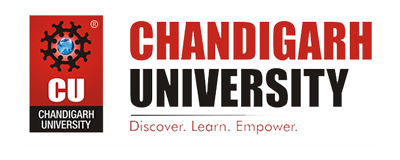
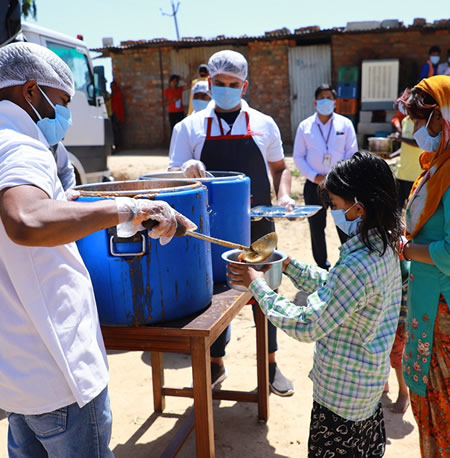
Photo: Team Chandigarh University at Gharuan village, distributing meals to poor and needy people.
Chandigarh, India, March 30, 2020 — Amid 21 days lockdown announced in India, the daily wagers working in factories and construction labor are braving the heat as they are confronting challenges to earn and find food for themselves and their families. Rising to the situation with the spirit of gesture in times of crisis, Chandigarh University is distributing cooked meals two times a day to poor & needy in the six neighborhood villages — Gharuan, Batta, Mankheri, Mamupur, Roorkee Pukta, and Madauli.
The distribution drive started from the first day of the lockdown and will continue throughout the 21 days, the University said. The meals are cooked in the University Mess and then transported to different locations using the institution’s transportation. Jai Vardhan, one of the volunteers participating in the drive, said, “We are currently catering to feed about 500 persons daily, but we can increase our capacity if more demand arises in the coming days.”
“Although the Government of Punjab is ensuring the distribution of food to the poor and needy community throughout the state, yet as an institution, it is our social responsibility to help the lower sections of the society in whatever manner we can,” said Satnam Singh Sandhu, Chancellor, Chandigarh University (CU).
“CU is also running an awareness campaign to educate the people and residents of villages about the safety precautions from the dreaded pandemic,” Mr. Sandhu added.
The University said that its team is also distributing free hand sanitizers prepared by its Department of Applied Health Sciences.
Chandigarh University (CU) is an autonomous educational institution approved by the University Grants Commission. It is the youngest University in India to be certified with A+ Grade by NAAC (National Assessment and Accreditation Council). CU offers more than 109 undergraduate and postgraduate programs in the field of engineering, management, pharmacy, law, architecture, journalism, animation, hotel management, commerce, and other disciplines.
|GlobalGiants.Com|
Edited & Posted by the Editor | 1:09 PM | View the original post
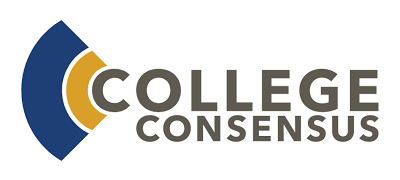

Photo: A scene from the UCLA (University of California Los Angeles) Campus. Image Credit: Corey Seeman.
CHAPEL HILL, N.C., — College Consensus has published its ranking of the Best Public Colleges and Universities in the USA. College Consensus is a college rating website that aggregates publisher rankings and student reviews.
To identify the Best Public Colleges and Universities in 2019, College Consensus combined the latest results from the most respected college rankings with thousands of real student reviews to produce an individual consensus score for each school. According to Consensus editors, “College Consensus gathers the publisher rankings and student reviews from around the web and distills the results into simple, easy to understand scores so students can quickly and easily compare schools.”
“The College Consensus methodology pulls together rankings from U.S. News & World Report, The Wall Street Journal, and Wallethub, averaging all of a given school’s numbers to get the Publisher Rating. Then we average student reviews from sites like Cappex, Niche, Student Review, and more, to get the full picture of how students see their colleges, which we call the Student Review Rating. Put them together, and we have the College Consensus,” the Consensus editors explained.
To help prospective college students and their families evaluate the educational options open to them, College Consensus has identified the best public colleges and universities.
• Top 30 Public Universities in the USA (According to College Consensus)
“Public schools often get ignored in rankings, despite their critical mission,” Consensus editors explained, “While the Ivy League and the wealthy, elite private research universities may get the most press attention and dominating rankings, public colleges and universities are a vital part of higher education in America.”
• Public schools generally provide a more affordable and accessible option for students than private colleges, helping to democratize higher education and build a more broadly educated citizenship.
“College Consensus gets the broadest ranking of the best public schools in the U.S. by bringing together a full selection of data from publishers and student reviews. National publishers use surveys, investigation, and statistics to rank colleges, while students writing their reviews use their own experience,” the Consensus editors elaborated. “College Consensus is a new approach to college rankings. We combine the latest results from the most respected college ranking systems with thousands of real student review scores.”
|GlobalGiants.Com|
Edited & Posted by the Editor | 12:26 PM | View the original post


ORLANDO, Florida, March 18, 2020 — To aid colleges and universities who must move to an online-only operation, Engineerica Systems is offering complimentary accounts of “Accudemia,” their award-winning center management and cloud-based software. These accounts are available free of charge through the rest of the academic semester.
Wanting to help as many people as possible during this time, Engineerica, Inc., will assist higher education institutions by providing a complimentary “Accudemia” account to academic student service centers such as tutoring, advising, or counseling. It would aid higher institutions as they transition to virtual offerings and services.
“Accudemia” allows center staff and students to arrange appointments and meet virtually, even from their homes. The platform also automates confirmation and reminder emails with a customized message so college staff can provide students detailed instructions for their meetings. Staff, advisors, or tutors can also log meeting notes and schedule future meetings. Administrators will be able to track and report these meetings.
“The Coronavirus disrupted everyone’s lives on a global scale and is forcing colleges to move their operations online on short notice,” says Engineerica’s president Mon Nasser. “We wanted to help in this transition by offering our academic center management technology to any educational institution that can benefit from it. This technology will help students get the assistance they need from college staff without risking exposure to the virus. To provide the fastest possible assistance, we decided to offer the service to new users at no charge from now until the end of the semester. Since this is a cloud-based system, setup is quick and easy, and users can access it from anywhere at any time. Our Orlando-based tech support department will help in the setup and usage of the system. There are no strings attached to this offer. We are only looking to do what we can to combat the negative effects of this pandemic and help our community.”
Engineerica, Inc., of Orlando, Florida, USA, is a technology firm founded in 1995.
|GlobalGiants.Com|
Edited & Posted by the Editor | 3:01 PM | View the original post
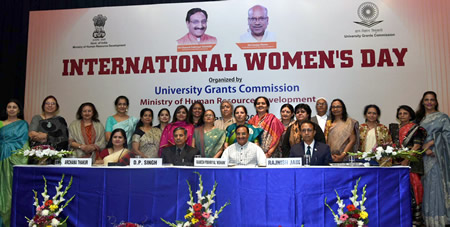
Photo: The Union Minister for Human Resource Development, Dr. Ramesh Pokhriyal Nishank, with the Vice Chancellors of Women Universities and Women Principals of Delhi Colleges, at an event to mark the International Women’s Day, in New Delhi on March 06, 2020.
New Delhi, March 6, 2020 — To mark the International Women’s Day 2020, Union Minister for Human Resource Development, Ramesh Pokhriyal Nishank, felicitated the Vice Chancellors of Women Universities and Women Principals of Delhi Colleges in New Delhi today. The University Grants Commission (UGC) had organized the celebrations.
The Minister also launched the SAKSHAM portal, developed by UGC, that aims to empower women on campuses through creating awareness on the current opportunities and initiatives, support, and redressal mechanism. The web resources (Government and United Nations policy documents) are made available to women students and employees of Higher Education Institutions through the portal.
• The Minister explained that the UGC’s SAKSHAM portal brings together information on all women-oriented initiatives and provides a platform for registering complaints related to violence and harassment against women in Higher Education Institutions. He further informed that an ‘Upload your Complaint’ option under Grievance Redressal is available on the portal.
Mr. Pokhriyal said that a healthy academic environment is a necessary prerequisite for ensuring the empowerment of women. The Minister informed that the New Education Policy is in the final stage, and it would have special provisions, funding, and scholarships for girl students.
• The University Grants Commission of India (UGC) is a statutory body set up by the Indian Union government per the UGC Act 1956 under the Ministry of Human Resource Development. UGC is responsible for the coordination, determination, and maintenance of standards of higher education in India. It provides recognition to universities and disburses funds to such recognized universities. UGC has its headquarters in New Delhi.
|GlobalGiants.Com|
Edited & Posted by the Editor | 12:12 PM | View the original post
 |
 |
